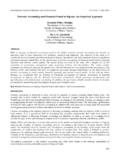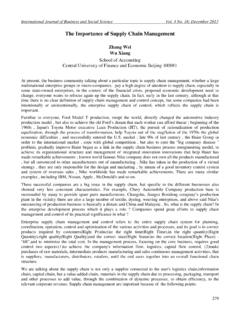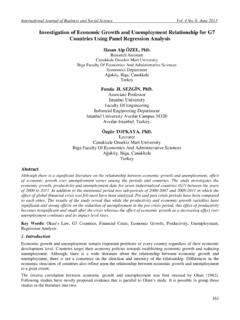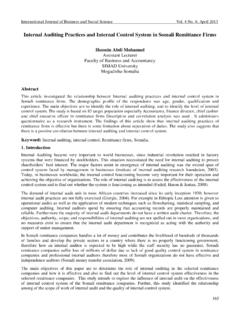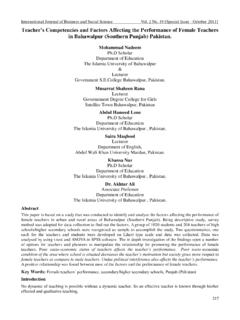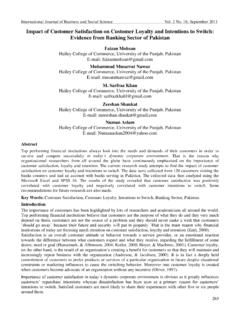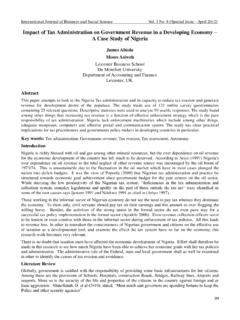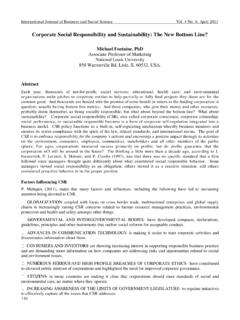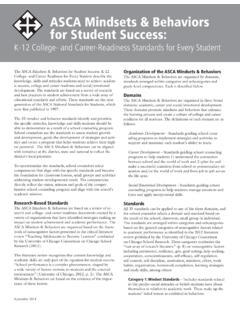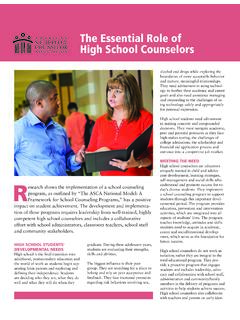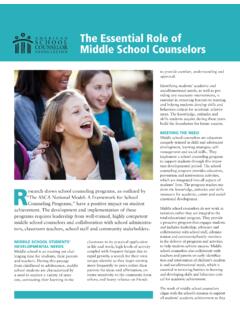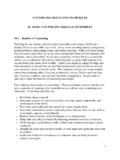Transcription of The Effect of the Time Management Skills of Students ...
1 International Journal of Business and Social Science Vol. 4 No. 5; May 2013. The Effect of the Time Management Skills of Students Taking a Financial Accounting Course on their Course Grades and Grade Point Averages Abd lkadir PEHL VAN. Assistant Professor Karadeniz Technical University Department of Business Administration Trabzon 61080, Turkey Abstract Time is a vital resource everyone possesses equally but fails to utilize at the same level due to a variety of reasons. All the material and human resources possessed by organizations can be enhanced in the course of time or be transformed as time goes on; yet the only asset that cannot be changed or purchased or stored is time . itself. Driven by this fact, particular emphasis has been paid in the modern education system to time Management issues by evaluating Students ' attitudes and behaviors related to time and its Management .
2 Based on the necessity of effective time Management required from Students majoring in financial accounting during their academic and professional life, field research has been conducted in the present paper towards the aim of designating their position with respect to effective time Management and determining the Effect of their time Management Skills on their GPA and course achievement. It has been concluded in this research that Students from Karadeniz Technical University hold moderate level time Management scores. When the research findings are analyzed with respect to the gender variable, it is revealed that in all sub-dimensions of the questionnaire, female Students obtained higher average scores than male Students . In a different research finding it has been demonstrated that there exists a positive significant relation between Students ' grade point averages and the time attitudes sub-dimension and between financial accounting grades and the long-range planning sub-dimension.
3 It has also been demonstrated by regression analysis that Students ' time Management Skills affect their GPA-course achievement and these Skills are one of the predictors of grade point averages and financial accounting grade points. Key Words: Time Management , Financial Accounting, Academic Achievement 1. Introduction In the modern world, time is seen as an indefinitely divisible and usable commodity. Accounting helps to infuse the concept of time through the organization. The regimes of the financial year, the annual audit, the monthly budget, the weekly financial reports and the daily cash statements are just a few of the ways in which the techniques of accounting bring a temporal dimension to bear on organizational affairs. Accounting also provides a way of acting across time. Both the past and the future can be brought into the present by accounting means.
4 Concepts such as risk can be given both a temporal dimension and a calculative form. It is as if a temporal fluidity can be created by calculative means (Acc. Org. and Society, 1996). Time is a vital resource everyone possesses equally but fails to utilize at the same level due to a variety of reasons ( r c et al., 2007: 10). All the material and human resources possessed by organizations can be enhanced in the course of time or be transformed as time goes on; yet the only asset that cannot be changed or purchased or stored is time itself. The secret to achieving success in life is effectively managing this resource that everyone possesses equally and paying sufficient emphasis to planning. A closer look at the definition of the Management concept shows that it is in reality an act of directing. Thus, Management of this ever-flowing time is decidedly the ability of one to direct himself/herself, his/her own deeds and all other activities, and to use time more effectively.
5 In other words, time Management corresponds to the process of stacking greater amounts of work and activity into a certain length of time. 196. Center for Promoting Ideas, USA This process depends on the pillars of decision taking on Management and selection making. The time Management process involves self-recognition of the individual first, familiarity with his/her own personal traits, conducting analysis on the time-use problem and collecting relevant data, assessing alternative solutions, selecting and implementing one of these alternatives (Izand zen, 2010). Though effective and efficient use of time varies with respect to the tasks performed, the further increase in the level of knowledge and Skills expected from modern employees has further increased the necessity of time planning. The road to success in social life passes through effective and efficient working which is only possible via time Management (Iz and zen, 2010).
6 The competitive environment we live in today encourages people from as early as their elementary education to plan and manage time effectively. The high performance required by competitive conditions forces organizations and directors to use time effectively and stipulates the search to control time. Likewise, in the process of providing educational services this issue has been a subject of interest discussed and emphasized in several platforms and an attempt has been initiated to assess and analyze time and the time Management attitudes and behaviors of Students in educational institutes. Since time is a limited resource which needs to be managed effectively just like all other limited resources, it has been deemed necessary to evaluate its effects on Students ' achievement. A general assumption underlines that Students with good time Management Skills are able to manage time effectively even after they graduate and enter professional life.
7 In literature studies it has been detected that positive time Management behaviors accelerate Students ' GPA, whereas negative time Management behaviors decrease academic performance (Britton and Tesser, 1991; Indreica et al.,2011; Mpofu et al,. 1996; Saketi and Taheri, 2010; Sevari and Kandy, 2011;. Tanriogen and Iscan, 2009). One of the fields that demands effective time Management during academic as well as professional life is the field of financial accounting. The present paper aims to detect the position of accounting Students with respect to effective time Management and to demonstrate that the Effect of time Management on their GPA and course achievement is a vanguard amid the existing research on accounting Students in Turkey. 2. Literature Review In the relevant literature there is a great number of academic studies focusing on the relation between time Management and GPA (Anand, 2007,Britton and Tesser, 1991,Indreica et al.)
8 ,2011, Macan et al., 1990, Misra and McKean, 2000, Mpofu et al., 1996, Saketi and Taheri, 2010, Sevari and Kandy, 2011, Swart et al.,2010, Tanriogen and Iscan, 2009, Yilmaz et al., 2010). Anand (2007) analyzed the correlation between video game usage and academic performance. Scholastic Aptitude Test (SAT) and grade-point average (GPA) scores were used to gauge academic performance. The amount of time a student spends playing video games has a negative correlation with Students ' GPA and SAT scores. As video game usage increases, GPA and SAT scores decrease. This research suggests that video games may have a detrimental Effect on an individual's GPA and possibly on SAT scores. Britton and Tesser (1991) tested the hypothesis that college grade point average would be predicted by timemanagement practices. Regression analyses showed that time Management components were significant predictors of cumulative grade point average.
9 According to Britton and Tesser, time Management attitudes and the Skills of university Students affect their academic achievement positively. In a study conducted by Indreica et al. (2011) personalized and flexible programs were developed under the supervision of an education counselor for each participant and the influence of effective time Management on GPAwas tested. The obtained findings supported the original hypotheses and it was thus concluded that effective time Management programs elevate GPA. In a study conducted by Macan et al.(1990),one hundred and sixty-five Students completed a questionnaire assessing their time Management behaviors and attitudes, stress, and self- perceptions of performance and grade point average. The study revealed 2 major findings. The Time Management Behavior Scale consists of 4 relatively independent factors. The most predictive factor was perceived control of time.
10 Students who perceived control of their time reported significantly greater evaluations of their performance, greater work and life satisfaction, less role ambiguity, less role overload, and fewer job-induced and somatic tensions. The findings were consistent with theory and advice on time Management but also indicated that the dynamics of time Management are more complex than previously believed. Misra and McKean (2000) investigated the interrelationship between academic stress anxiety, time Management , and leisure satisfaction among 249. university undergraduates by age and gender. 197. International Journal of Business and Social Science Vol. 4 No. 5; May 2013. It was demonstrated in their research that female Students possess more effective time Management Skills when compared to male Students and yet they face greater levels of academic stress and anxiety, while male Students cope with academic stress by making the most of leisure activities.
